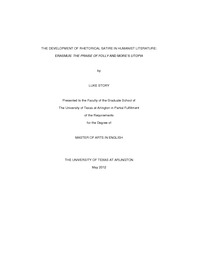
ATTENTION: The works hosted here are being migrated to a new repository that will consolidate resources, improve discoverability, and better show UTA's research impact on the global community. We will update authors as the migration progresses. Please see MavMatrix for more information.
Show simple item record
| dc.contributor.author | Story, Luke | en_US |
| dc.date.accessioned | 2012-07-25T19:08:22Z | |
| dc.date.available | 2012-07-25T19:08:22Z | |
| dc.date.issued | 2012-07-25 | |
| dc.date.submitted | January 2012 | en_US |
| dc.identifier.other | DISS-11772 | en_US |
| dc.identifier.uri | http://hdl.handle.net/10106/11041 | |
| dc.description.abstract | This thesis explores how early Renaissance humanists developed an effective rhetorical satire to combat the follies, injustices, and inequalities that afflicted the European population in the late Middle Ages, particularly Desiderius Erasmus' The Praise of Folly and Sir Thomas More's Utopia. I examine both how the humanists were able to work out of the satirical tradition that was popular in the Middle Ages as well as how they utilized the rhetorical knowledge from various classical texts that were rediscovered in the early portion of the Renaissance.I pay close attention to how More and Erasmus used aspects of narration, characterization, and textualized voicing to create a literary environment in which a rhetorical oration can exist. I explain how this textualized oratory allows the irony to emerge that is necessary for effective satire. | en_US |
| dc.description.sponsorship | Gustafson, Kevin | en_US |
| dc.language.iso | en | en_US |
| dc.publisher | English | en_US |
| dc.title | The Development Of Rhetorical Satire In Humanist Literature: Erasmus' The Praise Of Folly And More's Utopia | en_US |
| dc.type | M.A. | en_US |
| dc.contributor.committeeChair | Gustafson, Kevin | en_US |
| dc.degree.department | English | en_US |
| dc.degree.discipline | English | en_US |
| dc.degree.grantor | University of Texas at Arlington | en_US |
| dc.degree.level | masters | en_US |
| dc.degree.name | M.A. | en_US |
Files in this item
- Name:
- Story_uta_2502M_11772.pdf
- Size:
- 397.0Kb
- Format:
- PDF
This item appears in the following Collection(s)
Show simple item record


